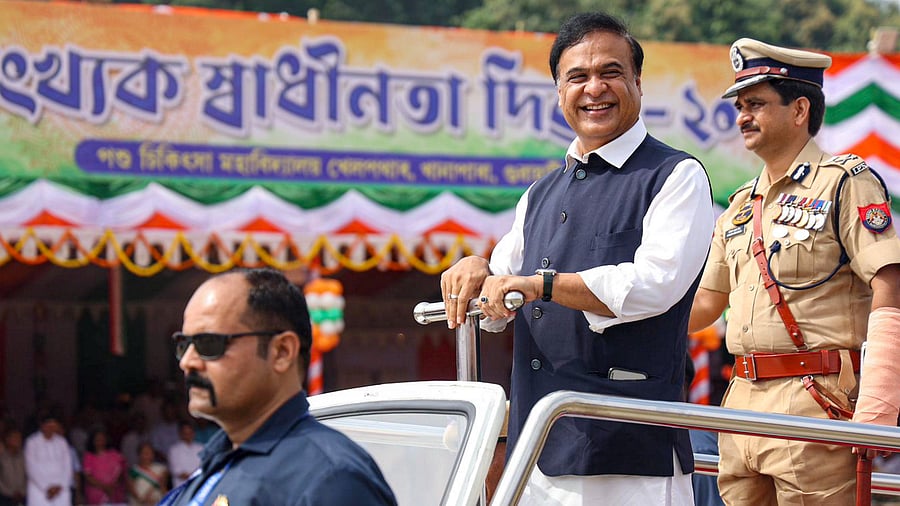
Assam Chief Minister Himanta Biswa Sarma
Credit: PTI Photo
Guwahati: In what Assam CM Himanta Biswa Sarma said would hasten the process to solve the state's long-standing foreigner problem, the state Cabinet on Tuesday approved a Standard Operating Procedure (SoP) to apply The Immigrants (Expulsion from Assam) Act 1950 to "swiftly evacuate" the post-1971 migrants from neighbouring Bangladesh and Pakistan.
Under the Act, the Deputy Commissioners or Additional Deputy Commissioners would be empowered to decide a case of "illegal migration" within 10 days and the person facing the charge of being illegal migrant would be "evacuated" to a "holding centre" for pushback by the BSF.
"At present, we have over 82,000 pending cases of illegal migrants in our Foreigners Tribunals. We cannot do anything with those cases but we will not register any fresh case in the tribunals . In fact, we will bypass the present tribunal system and the SoP now empowers the DCs and the ADCs to decide the citizenship within 10 days," Sarma told reporters in Guwahati after the Cabinet meeting.
"If the DC receives such information from the border police or any other source that a person is suspected to be an illegal immigrant, he will direct the person to produce evidence of his citizenship within 10 days. If the DC finds that the evidence submitted by the suspected illegal immigrant is not sufficient/satisfactory to prove his citizenship of India, he will record his opinion in writing identifying the person to be an illegal immigrant, which shall consist of a concise statement of facts and the findings thereof with reasons," Sarma said.
Expulsion order
Sarma said the DC will pass an expulsion order under Section 2(a) of The Immigrants (Expulsion from Assam) Act of 1950 with the direction to remove the illegal immigrant from Assam by giving 24 hours time and by the route so specified by him. "The DC will refer the cases to FT only if he cannot take a decision."
Present system
Cases related to "illegal migration" at present in Assam are being handled by the FTs, the quasi-judicial bodies, which were formed under the Foreigners Act 1946 and Foreigner (Tribunals) Rule 1964.
In case the accused fails to prove that he or his forefathers lived in India on or before March 24, 1971, he or she is declared foreigner by the Tribunals. The person is sent to detention centre but is allowed to challenge the FT order in the high court and the Supreme Court. The cut-off date for detection and deportation of foreigners to Bangladesh was decided as per the Assam Accord of 1985, a fallout of the six-year-long Assam Agitation or the anti-foreigners movement.
In October 2024, the Supreme Court had upheld the cut-off while disposing of petitions that challenged the same.
Sarma said while disposing the petitions and upholding the separate cut-off date for Assam under Section 6A of the Assam Accord, the apex court had opined that the detection with March 24, 1971 cut-off and the Immigrants (Expulsion from Assam) 1950 would go simultaneously.
"So we are going back to the 1950 Act to hasten our process of expulsion. The present FT system is complicated and takes a lot of time. Now, after a person is declared as illegal migrant by the DC/ADC, we don't even need to inform the embassies of the concerned country," Sarma said.
A lawyer in Gauhati High Court said that the decision to set up the FTs was taken in order to avoid the "arbitrariness and harassment" under the 1950 Act. "So are we going back to the same arbitrariness and harassment again?" he asked.
The SoPs were approved at a time the BJP-led government in Assam are carrying out an eviction drive targetting the Bengali-speaking Muslims, whom it calls "infiltrators" from Bangladesh. The Opposition Congress, however, said such steps are being taken as part of "polarisation tactics" of BJP in the run-up to the Assembly elections slated early next year.